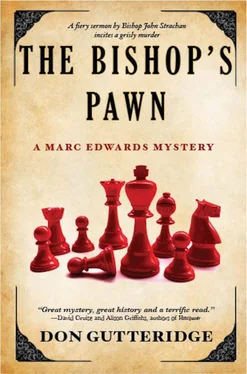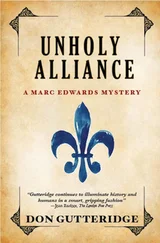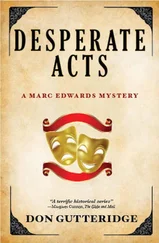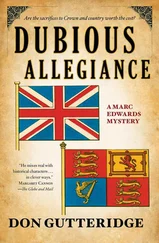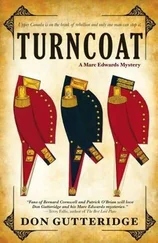Don Gutteridge - The Bishop's Pawn
Здесь есть возможность читать онлайн «Don Gutteridge - The Bishop's Pawn» весь текст электронной книги совершенно бесплатно (целиком полную версию без сокращений). В некоторых случаях можно слушать аудио, скачать через торрент в формате fb2 и присутствует краткое содержание. Год выпуска: 0101, Издательство: Bev Editions, Жанр: Исторический детектив, на английском языке. Описание произведения, (предисловие) а так же отзывы посетителей доступны на портале библиотеки ЛибКат.
- Название:The Bishop's Pawn
- Автор:
- Издательство:Bev Editions
- Жанр:
- Год:0101
- ISBN:нет данных
- Рейтинг книги:5 / 5. Голосов: 1
-
Избранное:Добавить в избранное
- Отзывы:
-
Ваша оценка:
- 100
- 1
- 2
- 3
- 4
- 5
The Bishop's Pawn: краткое содержание, описание и аннотация
Предлагаем к чтению аннотацию, описание, краткое содержание или предисловие (зависит от того, что написал сам автор книги «The Bishop's Pawn»). Если вы не нашли необходимую информацию о книге — напишите в комментариях, мы постараемся отыскать её.
The Bishop's Pawn — читать онлайн бесплатно полную книгу (весь текст) целиком
Ниже представлен текст книги, разбитый по страницам. Система сохранения места последней прочитанной страницы, позволяет с удобством читать онлайн бесплатно книгу «The Bishop's Pawn», без необходимости каждый раз заново искать на чём Вы остановились. Поставьте закладку, и сможете в любой момент перейти на страницу, на которой закончили чтение.
Интервал:
Закладка:
Langford was the researcher parexcellence , who pored over legal tomes to mine the nuggets thatthe theatrical and brilliant Dougherty could deploy in the criminaland civil courts of the city and state. Paradoxically, once out ofcourt Dougherty was awkward with people, shy even, disabled as itwere by his overweening intellect and his searing insight into thefoibles and casual cruelties of his clients and their “enemies.” Onthe other hand, Dennis Langford, bookworm that he was, foundhimself at ease in social situations. Some of this natural,disarming charm had obviously been handed on to his son and helpedto explain, for Marc, Brodie’s success at the Commercial Bank,where callow Yankee scions were not exactly embraced.
Celia and Brodie had been raised by a nannyand tutored at home before being sent to private school as theyapproached puberty. Dougherty, whom they saw every day at mealtimesand who accompanied them on picnics and promenades, encouraged themto call him “uncle.” But four years ago, in 1835, Dennis Langfordhad died of pneumonia, and an idyllic childhood ended withoutwarning.
“That’s when your uncle became your officialguardian?” Marc said.
“Yes. My father wished it, and I don’t thinkCelia and I could have survived without him there in our lives – ashe had been as long as we could remember. Uncle inherited thebusiness and was made trustee of our legacy. Now we have it all.But not him.”
Some time later, Marc nudged the story backtowards Dougherty’s career. “Did your uncle make enemies? Peoplewho might wish him harm?”
Brodie gave Marc a wry smile. “He was alawyer in New York.”
Brodie then answered the question indirectlyby filling Marc in on the fractious politics of that great city.After his father’s death, Brodie was sent to an up-state prepschool. There he hobnobbed willy-nilly with the sons of thearistocracy and the nouveau riche . The former, Brodieexplained, were known as Whigs or Federalists, and were tantamountto English Tories, bent on perpetuating their privileges andmaintaining centralized control in government. The new middle classcalled themselves Republicans or Republican-Democrats, and demandedstates’ supremacy, local control, and the unfettered right to makethemselves rich.
But in New York City itself, he said,candidates for Congress, the State Legislature or the CommonCouncil of the municipality were predetermined and guaranteedelection by the powerful members of Tammany Hall. The latter wasnominally a fraternal organization – the Society of St. Tammany orthe Columbian Order – but had evolved into the ruling clique of themiddle class, championing the worker in public forums but in factexploiting him privately for their own ends. Their corruption waslegion. Even though he had been only fifteen years old, Brodielearned of these sad truths by listening to the boasts andarguments of his classmates. He heard tales of men whose careershad been crushed because they had defied Tammany Hall, theirproperty auctioned off and their families thrown into the poorhouseor debtor’s prison. This was the dangerous and unpredictable worldthat his father and uncle had taken such pains to shield himfrom.
“Did your uncle defy Tammany Hall?”
“He stayed clear of politics as far as hecould. He revered the law. And after we came to Toronto, he did,despite his near-withdrawal from the society of his fellow man,keep up with the affairs of the city that expelled him.”
“But how?”
“He had the newspapers from Buffalo andSyracuse mailed to him every week. When I saw him reading them andgrumbling away, I took the opportunity to engage him in aconversation which I felt was long overdue. He would not tell memuch, mind you – he just seemed too tired sometimes to move hislips, though that brain of his never rested. But I do know that hewas appalled at the way Tammany members rigged elections,bamboozled citizens with their high-flown, jingoistic rhetoric,wrapped themselves in Jefferson’s cloak and, worst of all, abusedand corrupted the very laws they proclaimed sacred.”
“So, as far as you know, he managed to walkthrough that minefield?”
“I think he did, mainly by taking on capitalcases like murder or attempted murder or armed robbery – and so on.He avoided civil cases, in part I’m sure because he thought thejuries would be suborned by the influence of Tammany or theirpolitical opponents.”
“But?”
“But when President Andrew Jackson, towardsthe end of his second term, finally destroyed the United StatesBank at the behest of groups like Tammany and Loco-Foco,states-first Democrats, the result was a run on all banks, thecollapse of paper money, and an instant economic depression.”
“I saw some of the consequences of that inDetroit last January.”
“Ten thousand workers in New York City losttheir jobs. The Common Council turned down a request for rentrelief because the rents for city-owned tenements, which werealready thirty-five percent higher than in Brooklyn across theriver, helped line the pockets of those in office.”
“How did your uncle get involved?”
“A group of once-prosperous tradesmen came tohim with a tale of having been bilked out of their meagre savingsby the New York and Albany Fire Insurance Company. When the ‘greatfire’ of the previous year threatened to ruin the company, itsdirectors declared bankruptcy, pillaged its assets, and went toTammany Hall for protection. One of them, Silas Biddle, fled toFrance, but the president, Paxen Wetmore, stayed put. As a formersachem in Tammany – they use Indian names for all their offices andparade up and down Broadway in Indian costumes – he felt himselfimmune from prosecution.”
“And Dick took on the case?”
“He did. He knew the jury would be pickedfrom Tammany ward-heelers, but his clients had provided him withincontrovertible evidence. That, in combination with his eloquenceand vigorous cross-examination of Wetmore, resulted in a hungjury.”
“So Wetmore got off?”
“Yes. Even if convicted, he never would havepaid restitution. Uncle told me, as we chatted together in ourcottage last fall, that Tammany’s control of the city council andthe state legislature permitted it to pass laws that inevitablyabsolved malefactors – after the fact. At worst, Wetmore would havebeen allowed to flee the country.”
“So Dick did not really hurt Tammany?”
“Oh, but he did. He told me that hiscross-examination of Wetmore had been harrowing and effective.Wetmore’s reputation was in tatters. He would stay out of jail, butthat was about all. You see, he was ambitious to run for statesenator as a Democrat.”
“And your uncle felt that Tammany might notforgive a lawyer who had taken one of their sachems down?”
Brodie stared out at the brilliant bluewaters of Lake Oneida. “They never forgive – or forget.”
Could such a desire for revenge have extendedas far as an assassination in Toronto? It now seemed possible.
Marc felt he had to press on: “Do you thinkthat Tammany Hall was responsible for your having to leave NewYork?”
“Yes, I do. But you have to believe me when Itell you that Uncle refused to explain the nature of his so-called‘disgrace’ or whether the decision to leave was voluntary orcoerced – then or at any time thereafter.”
“It’s clear that he never intended to tellanyone,” Marc said sympathetically. “But your leaving was abrupt, was it not?”
“Yes. Celia and I were home on holiday whenUncle arrived one afternoon and announced that we had to go. Hesaid a friend would see to the disposal of our property, but thatwe ourselves had to leave before sunset. We were stunned. But wetrusted Uncle, and could not conceive of living without him. Wepacked our bags. The only explanation he gave us was that what hehad decided was for our own good – to protect us.”
Читать дальшеИнтервал:
Закладка:
Похожие книги на «The Bishop's Pawn»
Представляем Вашему вниманию похожие книги на «The Bishop's Pawn» списком для выбора. Мы отобрали схожую по названию и смыслу литературу в надежде предоставить читателям больше вариантов отыскать новые, интересные, ещё непрочитанные произведения.
Обсуждение, отзывы о книге «The Bishop's Pawn» и просто собственные мнения читателей. Оставьте ваши комментарии, напишите, что Вы думаете о произведении, его смысле или главных героях. Укажите что конкретно понравилось, а что нет, и почему Вы так считаете.
